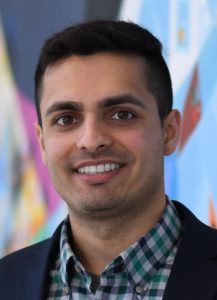Two University of Chicago innovators developing quantum technologies are among six selected for Argonne National Laboratory’s entrepreneurship program, Chain Reaction Innovations, which helps scientists launch and scale their businesses.
The Chain Reaction Innovations (CRI) program – in its fourth year – is funded by The Advanced Manufacturing Office within the US Department of Energy’s Office of Energy Efficiency and Renewable Energy. In total, 156 applied to the program as part of the national solicitation process. The top 15 in February took part in the Finals Pitch Competition at Argonne.
“The CRI program provides two years of intense support to help scientists learn how to de-risk science-based innovations and build a business around them,” said CRI Director John A. Carlisle. “This way, they can successfully translate their discoveries into real applications that have high societal and economic impact.” CRI innovators have raised nearly $18 million and helped create 76 jobs as of February 2020.
Beginning in June, each innovator from the new cohort will work, full time, with a host scientist at Argonne. They also will receive support from mentors at UChicago’s Polsky Center for Entrepreneurship and Innovation and mHUB.
PRANAV GOKHALE AND SUPER.TECH
 Pranav Gokhale, a doctoral candidate in quantum computer architecture at UChicago, has developed Super.tech as an extension of the National Science Foundation’s Enabling Practical-Scale Quantum Computation (EPiQC) research project.
Pranav Gokhale, a doctoral candidate in quantum computer architecture at UChicago, has developed Super.tech as an extension of the National Science Foundation’s Enabling Practical-Scale Quantum Computation (EPiQC) research project.
“Super.tech aims to close the gap between quantum hardware and quantum software, in order to realize practical applications sooner than otherwise possible,” said Gokhale, noting that current methods for controlling quantum computers must choose between accurate physics-based approaches or scalable computer science-based approaches.
“Our technology is uniquely interdisciplinary, achieving both accuracy and scalability,” he said. “Concretely, our research has already led to 5x performance gains, and we expect another 10x improvement from ongoing work.”
Speaking to Gokhale’s work, Carlisle said Super.tech “enables the development of software and hardware that we expect will have the same impact on quantum computing that Microsoft Windows had on personal computing.”
A few years ago, Gokhale was an Innovation Fund Associate, a role in which he gained first-hand experience evaluating early-stage companies and responding to investor questions, said Melissa Byrn, director of innovation programs at the Polsky Center.
“He’s spent the last few years building up his personal entrepreneurial skillset in addition to his training and technical development in his PhD program,” she added.
MATTHEW ACKERMAN AND QDIR
 A PhD candidate in physical chemistry at the University, Matthew Ackerman since 2016 has been working to increase the technology readiness level of photodetectors based on mercury telluride (HgTe) colloidal quantum dots.
A PhD candidate in physical chemistry at the University, Matthew Ackerman since 2016 has been working to increase the technology readiness level of photodetectors based on mercury telluride (HgTe) colloidal quantum dots.
Ackerman said the approach is in contrast to the industry’s standard processes and will drive the cost-reduction of infrared technologies: “These quantum dot inks are solution processable, which enables low-cost, scalable manufacturing and simplifies the integration of the infrared absorber with the silicon readout electronics,” he explained.
“With the support of CRI, I hope to validate the imaging capabilities of HgTe colloidal quantum dots in the shortwave and mid-wave infrared with potential customers,” Ackerman added, noting that support from CRI mentors will “significantly expedite these technical milestones and business development,” helping his company – QDIR – to attract strategic partners and future funding.
“Matt’s innovation will dramatically reduce the cost of making thermal imaging cameras and sensors so they can be more broadly used for applications like autonomous transportation and AI-guided vision systems for advanced manufacturing,” said Carlisle.
Additionally, the technology could be used to monitor groups of people to detect quickly whether someone is running a fever – making the innovation especially notable today amid the current Covid-19 pandemic. “The goal would be to allow for a relaxing of the shelter-in-place policies while also protecting overall public health,” said Carlisle.
Ackerman also participated in the Polsky Center’s fall 2019 I-Corps cohort. The 7-week program is designed to empower UChicago scientists, researchers, and students to test the commercial potential of their research and ideas. Participating in the program enabled Ackerman and faculty inventor professor Guyot-Sionnest to explore and validate the customer segment and value proposition aspects of their business model, Byrn said.
“Their dedication to the process and their openness to external feedback demonstrates to me that they are committed to bringing their technology to the market and are well positioned for success,” she added.
Both Gokhale and Ackerman also are 2020 George Shultz Innovation Fund finalists. The multi-million dollar venture-philanthropy fund is a perennial feature with 100% of returns reinvested to support startups across the University of Chicago, Argonne, Fermilab, and Marine Biological Laboratory ecosystem.
“I am thrilled that they have been accepted to the Chain Reaction Innovations program and the Innovation Fund,” noted Byrn. “These programs will help them continue to scale and launch.”

